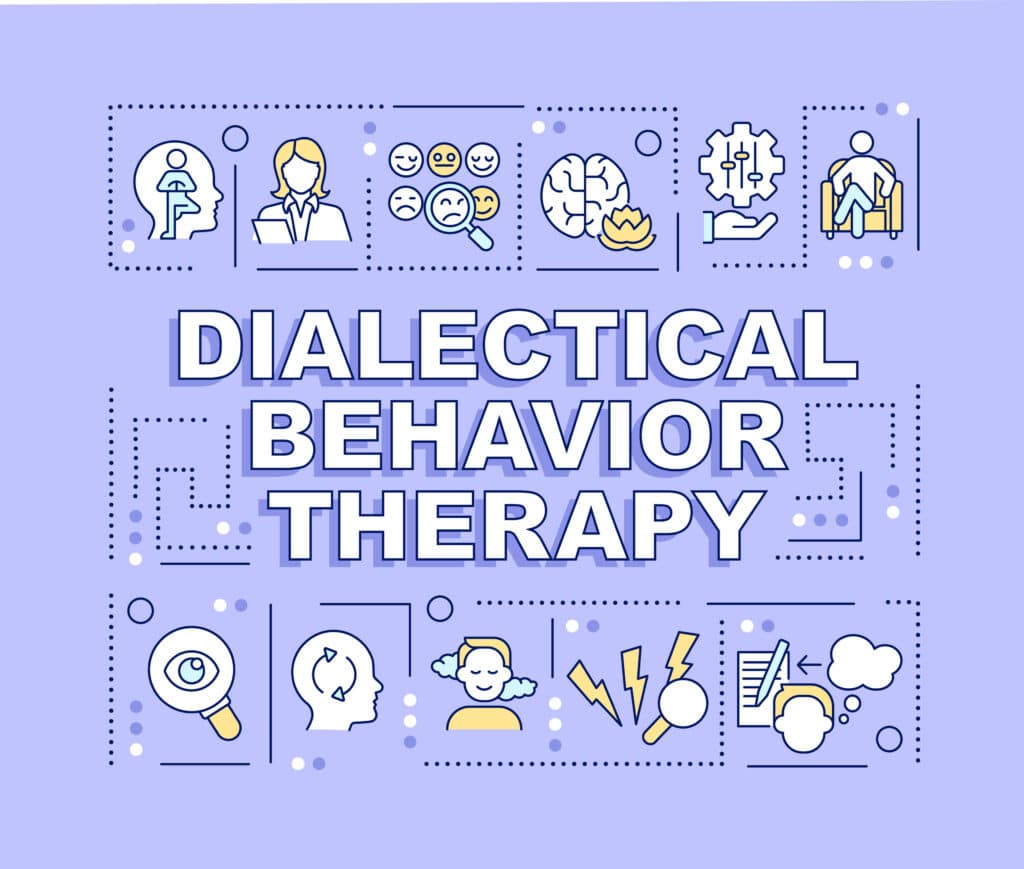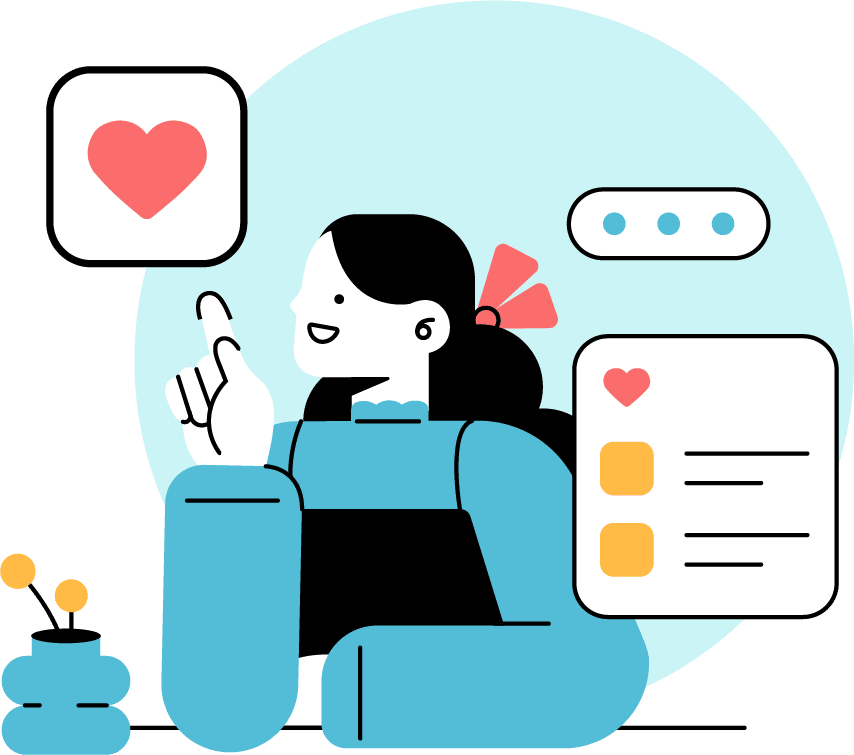Dialectical behavior therapy (DBT) is a widely accepted effective treatment option for individuals with various mental health problems that struggle with emotional regulation.
Adapted from cognitive behavioral therapy (CBT), DBT emphasizes easing anxiety and other side effects of mental health conditions through focused learning and practice.
As we discovered in the last few years, online therapy is an effective treatment method for individuals around the world seeking treatment. Thanks to the technology at our fingertips, accessing proper mental health care is entirely possible through a computer screen or over the phone.
If you or someone you know is looking into DBT therapy online, this post covers everything you need to know about a comprehensive DBT treatment plan. You’ll discover the various types of therapy, the work you’ll do, and how you can find success in the online environment.
What is dialectical behavior therapy (DBT)?
Dialectical behavior therapy is a form of talk therapy (also known as psychotherapy) that was originally designed to help patients with borderline personality disorder find relief from intense emotional outbursts.
Today, it’s used by many therapists to treat various mental health conditions, including:
- Anxiety
- Depression
- Suicidal behavior
- Self-destructive behaviors, including self-harm
- PTSD (post-traumatic stress disorder)
- Borderline personality disorder
- Eating disorders, including binge eating and bulimia
- Substance abuse and addiction
DBT therapy is adapted from cognitive behavioral therapy (CBT), with an emphasis on helping individuals who experience intense emotions learn to regulate their feelings in positive ways.
In DBT therapy sessions, patients will learn how to accept their own realities and the mental health conditions they’re living with. DBT focuses on patients learning from present situations without emphasizing heavily on the past.
Additionally, through skills training, they will learn to change destructive behaviors that negatively impact their daily life.
How does online DBT therapy work?
For the most part, dialectical behavior therapy online is very similar to the structure and format of in-person sessions.
Most patients will attend weekly individual therapy sessions with a trained DBT therapist and also attend a DBT group session where they will practice DBT skills in real-world scenarios with other clients.
Individual therapy sessions will occur on a conferencing platform like Zoom, where you can chat one-on-one with a therapist just as you would in an office setting.
In a skills group, patients join a shared Zoom meeting and communicate through video. The facilitator of the group will guide the meeting while teaching DBT skills, hosting activities, and ensuring participation from as many patients as possible.
The primary difference between DBT therapy online and in-person sessions is that the patient has to be more inclined to participate in the online setting. When in person, it’s easier for therapists to encourage individuals to share their feelings and talk about their emotions or experiences.
When online, the responsibility becomes more in the hands of the patient to be engaged in the conversation and doing the work. It’s much easier to hide behind a screen and simply observe rather than participate.
This can be challenging for patients who aren’t as open to therapy or struggle with social settings, so committing to online therapy means you have to be ready to put yourself out there in group settings.
Types of dialectical behavior therapy
The two types of dialectical behavior therapy that are used for patients are individual therapy and skills groups.
Individual therapy
Individual treatment is typically once a week. These one-on-one sessions can be anywhere from 30 minutes to an hour long.
In individual dialectical behavior therapy sessions, patients will collaborate with a dialectical behavior therapist to determine what destructive behaviors are disrupting their daily lives and what they stem from. Additionally, patients will:
- Gain coping skills
- Learn to replace unhealthy thinking
- Develop awareness of harmful behaviors and thoughts and reduce them entirely
- Reach specific goals and improve quality of life
Many DBT therapists have their patients use diary cards to increase their self-awareness and document feelings, emotions, and thoughts. Patients will bring the diary cards to future therapy sessions and discuss the dialectical behavior therapy skills they applied and how they can improve.
Once you complete individual therapy sessions, you will likely participate in DBT skills training in a group setting.
Skills Group
Online dialectical behavior therapy skills training consists of a trained DBT therapist teaching you new skills in a group setting. Think of skills training as a lesson where you learn new things and apply them in a safe setting with other individuals.
The benefits of community mental health support are significant; patients with similar mental health conditions can improve their social skills, feel less alone, and rely on others for perspective and hope for recovery.
While a DBT skills training group can provide support for individual patients, that is not the primary purpose of the group. A DBT skills group is an effective form of learning therapy that includes lessons, skills training, and homework.
It is paired with individual therapy, but it’s not like group therapy, where patients talk about their feelings and emotions.
Skills you’ll learn in online dialectical behavior therapy
There are a few important skills patients will gain in online dialectical behavior therapy that will help them throughout recovery and as they go about their lives post-treatment. These include:
Mindfulness
Mindfulness teaches patients how to pay attention and observe what is happening at the present moment, rather than focusing on past issues or problems.
Distress tolerance
Distress tolerance teaches patients how to properly manage emotions in healthy ways, particularly in triggering or stressful situations. Stress often triggers problematic behaviors, which DBT aims to re-train into more productive ones.
From a DBT therapist, patients will gain an understanding of their emotions and why they respond in certain ways, along with learning how to accept those feelings without any judgment.
Interpersonal effectiveness
Interpersonal effectiveness is all about setting boundaries, standing up for yourself, and learning to ask for what you want and need. Properly communicating your needs with others is an important step in prioritizing your mental health and is, therefore, an integral part of DBT therapy.
Emotional regulation
DBT therapy was adapted from cognitive behavioral therapy to cater to individuals with intense emotions. Emotional regulation is a pillar of dialectical behavioral therapy because it teaches patients how to identify emotions, determine their root causes, and learn how to manage them in healthy ways.
Challenges of DBT therapy
While considered safe and effective, dialectical behavior therapy can be very challenging for some individuals.
It’s designed for people who can fully commit to attending therapy sessions, completing the homework assigned by the therapist, and for those who are comfortable participating in group sessions. Most importantly, patients have to be ready to move on from their past mistakes and challenges to face the future head-on in order to see success and recovery from DBT therapy.
Additionally, because the online therapy setting is relatively new and evolving, patients and healthcare providers may encounter issues related to internet issues, technological hiccups, or a lack of access to proper equipment for online sessions.
Online therapy may be the right fit for you. Find out more with Clear Behavioral Health.
In-person therapy isn’t for everyone. There are many reasons more individuals seek online therapy now—the pandemic revealed how effective it is (for some people) to receive treatment without leaving the home.
For many patients, traveling to see a DBT therapist can be triggering and uncomfortable. For others, work schedules, geographical locations, and family obligations make it challenging to attend therapy sessions in person. If you are struggling, the sooner you receive treatment, the better.
At Clear Behavioral Health, we are proud to offer virtual therapy treatment options for patients who prefer it to in-person sessions. Patients receive the same high-quality mental health treatment and care, with an emphasis on acquiring new skills, healthier coping strategies, and overcoming triggers to help them reintegrate back into daily life.





